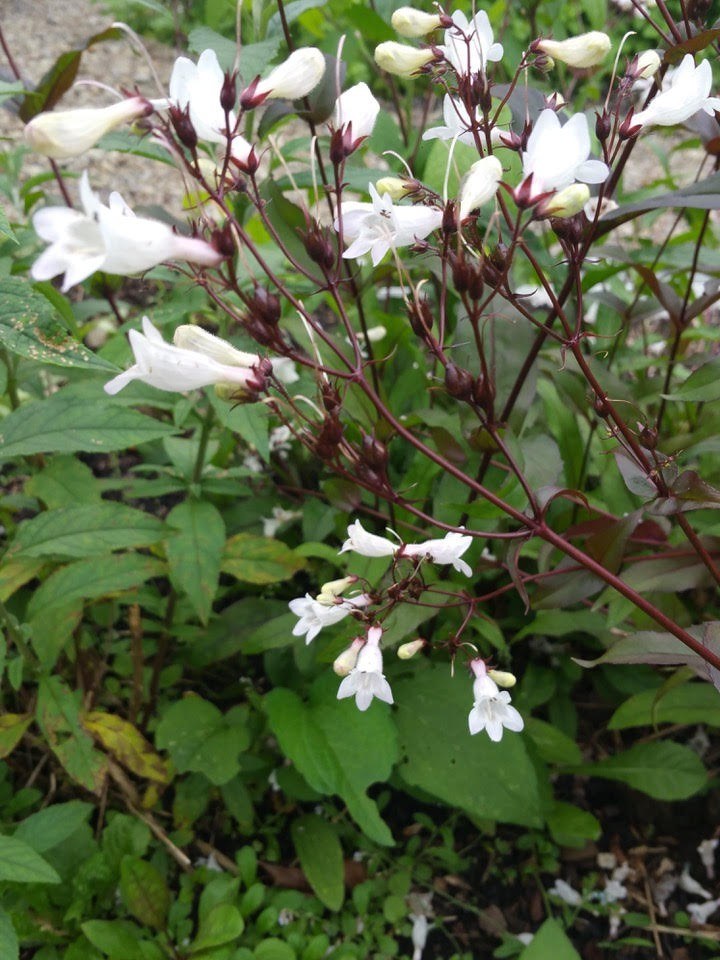If you are looking for inspiration for creating or renovating a garden, wish to see native plants in bloom or simply stroll through a beautiful garden setting, a visit to the Slippery Rock Community Park garden maintained by Penn State Extension Butler County Master Gardener volunteers would be a perfect place to visit!

Penstemon digitallis husker red in bloom at the Slippery Rock Garden
If you are looking for inspiration for creating or renovating a garden, wish to see native plants in bloom, or simply stroll through a beautiful garden setting, a visit to the Slippery Rock Community Park garden maintained by Penn State Extension Butler County Master Gardener volunteers would be a perfect place to visit! The garden is located within the 60-acre Slippery Rock Community Park at 310 North Main Street, Slippery Rock. It is free, open to the public, and ADA accessible.
Planted as a demonstration garden, the Slippery Rock Garden is currently a mixture of over 25 native and a few non-native plant varieties. Each growing season, volunteers plant new native species, with the goal of phasing out non-native species. The garden has been certified as a pollinator garden by the Penn State Extension Pollinator Garden Certification Program since 2014. As a certified pollinator garden, the Slippery Rock Garden provides visitors with design inspiration by demonstrating the main criteria for attracting pollinators. The majority of plants you will see are planted to attract native pollinators and follow planting guidelines established in the certification program. They are planted to bloom at different times throughout the growing season and have a variety of shapes and colors. The design of the garden showcases the plants in clumps and drifts optimizing their attraction to bees, butterflies, moths, and other pollinators. In addition to nectar and pollen, the plants provide habitat and shelter. Some varieties are caterpillar host plants as well.
Highlights of the garden include several unusual species. Clove currant (Ribes odorata) is a native shrub of the central United States that has been widely planted in the east. In the spring, trumpet-shaped yellow flowers scent the air with cloves. The shiny black currant fruits are edible and can be made into juice, jam, jelly, or pies. Fringe tree (Chionanthus virginicus) is another specialty of the garden. Native to Pennsylvania, fringe tree gets its common name from the airy, drooping clusters of narrowly petaled flowers that give it the appearance of being draped in soft, white fringe. The flowers are lightly fragrant and the late summer fruits are a food source for birds and wildlife.
Many of the perennials planted in the beds are native and provide pollen and nectar for pollinators and some act as host plants for caterpillars. In early-to-late spring, golden ragwort (Packera aurea) creates a bright golden yellow mass of blooms throughout the garden. Beardtongue (Penstemon digitalis 'Husker Red') is a popular nectar plant for hummingbirds and bees when it blooms from late spring into mid-summer. Obedient plant (Physostegia virginiana) blooms from late June through September and is called "obedient" because each individual flower, if pushed in any direction, will remain in the new position temporarily. Common milkweed (Ascelpias syriaca), bee balm (Monarda didyma), purple coneflower (Echinacea purpurea), and blazing star (Liatris spicata) fill the garden at the height of summer. New England asters (Symphotrichum nova-angelicae) and goldenrods (Solidago spp.) bloom in late summer until frost.
Project coordinators Julie and Marty Meyers direct a cadre of more than 12 Penn State Extension Butler County Master Gardener volunteers who plan, plant, weed, and mulch the garden. Due to Covid-19 restrictions during 2020, work on the garden was curtailed significantly. However, Master Gardener work days in 2021 will have the garden in perfect shape for a visit. If you find Master Gardener volunteers working in the Garden, feel free to engage in conversation. Master Gardeners always welcome any questions and are happy to talk about the plants growing there.
If you have questions about the Slippery Rock Demonstration Garden, pollinator plants or the Penn State Extension Pollinator Garden Certification Program, call the Butler County Master Gardener Garden Hotline at 724-287 4761, ext. 7 or email the Master Gardeners at butlermg@psu.edu.
by Mary Alice Koeneke, Julie Meyers, Marty Meyers
Appeared in the July 8, 2021 edition of the Butler Eagle

